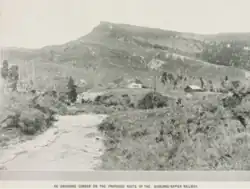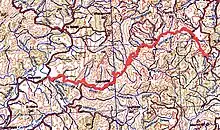| Mangapōike River | |
|---|---|
 Mangapōike River in 1911 | |
| Location | |
| Country | New Zealand |
| Physical characteristics | |
| Source | |
| • location | Whakapunake |
| • elevation | 962 m (3,156 ft) |
| Mouth | |
• location | Wairoa River |
• elevation | 20 m (66 ft) |
| Length | 42 km (26 mi)[1] |
The Mangapōike River is a river beginning in the Gisborne Region of New Zealand's North Island. It flows generally southwest from sources south of Waingake, reaching the Wairoa River in Hawke's Bay 10 kilometres (6 mi) northeast of Frasertown.[1] Mangapōike River was Gazetted as an official name on 28 November 2022.[2]
Whakapunake at 962 m (3,156 ft) is the highest point in the catchment, with the Mangarangiora Stream draining its eastern slopes into the Mangapōike.[3] Whakapunake is traditionally where Māui snagged his fish hook. It is the northern boundary of Ngāti Kahungunu's rohe.[4] A 200 ft (61 m) transmitter mast was built at the south end of Whakapunake in 1969.[5] It is now operated by Kordia.[6] In the river's main catchment, 740 m (2,430 ft) Pūkaroronui is the highest point.[7]
The main geological influence on the river is that it drains from the Mangaone Anticline to the Wairoa Syncline. Below Tukemokihi the river runs through Cenozoic limestones.[8] From Tukemokihi, upstream, the rocks are Miocene mudstones and sandstones.[8][9]
Lake Te Horonui formed after 25 February 2018, when about 200 m (660 ft) of a sandstone hill slipped and dammed the river. The landslide was probably due to the river cutting into the foot of the dip slope, where water trapped in the sandstone by an impermeable mudstone may have lubricated the bedding plane.[10] After over 144 mm (5.7 in) of rain fell on 9-10 March, the 50 m (160 ft) deep lake grew from 9 ha (22 acres) to 30 ha (74 acres) and soon to 33 ha (82 acres). The bridge to Mangapōike Station might have flooded if a channel hadn't been blasted on 28 March and 9 April, allowing water into another new lake, Tukemokihi, and lowering Lake Te Horonui back to 30 ha (74 acres). Part of the detached slide block remained as a mass of around 8.5 million tonnes. The new lake is being used by grebes.[11] The name Lake Mangapōike was also considered, but The Minister for Land Information, Damien O’Connor, agreed to the new name, which refers to the landslide.[12]
There are three gravel roads in the valley, but they have no direct link to each other. From the tar-sealed Tiniroto Road, Kotare Road runs a few kilometres east.[13] It ends at a gorge (named by one study as Haupatanga), which is over 100 m (330 ft) deep and largely inaccessible.[14] Mangapōike Road runs through the Makaretu Stream valley to join the Mangapōike valley and then along the south bank of the river to Tukemokihi.[15] The upper catchment is partly accessed by Paparatu Road.[16]
A preliminary survey for the Napier-Gisborne railway in 1905 favoured using the valley,[17] with a tunnel linking it to Te Ārai valley.[18] It was rejected in 1912, in favour of Hangaroa, Waikura and Ngātapa, as they served an area thought to have more economic potential.[19]

There were two small schools in the valley. Paparatu School was on Paparatu Road. It was built in 1938,[20] had 14 on its roll in 1947[21] and closed between 1978[22] and 1986.[23] Tukemokihi School was open by 1931.[24] It closed at the end of 2006[25] and was given back to its previous landowners in 2012.[26]
Paparatu was the scene of an ambush on Te Kooti in 1868, after his escape from Rēkohu.[27]
Gisborne's water supply comes partly from reservoirs at the head of the valley. Water was first piped from the Mangapōike valley in 1917. In October 1942 ratepayers approved a £45,000 loan for a 246 million gallon 246,000,000 imp gal (1,120,000 m3) reservoir, designed by G. F. Clapcott, the borough engineer, with a 3.25 mi (5.23 km) pipeline and an 80 ft (24 m) tunnel to Te Ārai valley.[28] The arch dam[29] is 50 ft (15 m),[30] or 40 ft (12 m) high, covers 58 acres (23 ha) and filled in May 1948. A new pipeline and a 330 ft (100 m) tunnel[31] now connects the 1948 Clapcott Dam, the 1972 Sang Dam (347,568 m3 (76,454,000 imp gal)) and the HC Williams Dam, built in 1974 (1,833,491 m3 (403,312,000 imp gal)).[32] In 2023 Cyclone Gabrielle damaged 9 of the 21water pipe bridges in the network and left two of reservoirs with cloudy water.[33] Sang has an earth dam.[34]
The Cyclone also left forestry slash backed up for more than 50 m (160 ft) at the bridge where the Mangapōike joins the Wairoa.[35] Te Puna Bridge, near Tukemokihi,[36] had a pier damaged.[37]
See also
References
- 1 2 "Place name detail: Mangapōike River". New Zealand Gazetteer. New Zealand Geographic Board. Retrieved 20 December 2022.
- ↑ "Mangapōike River". gazetteer.linz.govt.nz. 28 November 2022. Retrieved 5 November 2023.
- ↑ "Whakapunake, Hawke's Bay". NZ Topo Map. Retrieved 5 November 2023.
- ↑ Whaanga, Mere (3 March 2017). "Ngāti Kahungunu - Tribes and lands". Te Ara - the Encyclopedia of New Zealand. Retrieved 5 November 2023.
- ↑ "Come In Wntv-1 - Gisborne Photo News - No 178 : April 23, 1969". photonews.org.nz. Retrieved 5 November 2023.
- ↑ "Creating a Sustainable Business". www.kordia.co.nz. Retrieved 5 November 2023.
- ↑ "Pukaroronui, Gisborne". NZ Topo Map. Retrieved 5 November 2023.
- 1 2 "Maps - QMAP Digital Download". shop.gns.cri.nz. Retrieved 5 November 2023.
- ↑ "Geology of the Raukumara Area, vol. 6. Institute of Geological & Nuclear Sciences 1:250 000 geological map". January 2000.
- ↑ McGovern, Sam; Brook, Martin S.; Cave, Murry (2 November 2020). "Geomorphology and triggering mechanism of a river-damming block slide: February 2018 Mangapoike landslide, New Zealand". doi:10.1007/s10346-020-01572-7. ISSN 1612-510X.
{{cite journal}}: Cite journal requires|journal=(help) - ↑ "Our land, our soil" (PDF). Gisborne District Council. 2020.
- ↑ Sharpe, Marty (29 November 2022). "Dispute over naming NZ's 'newest lake' goes all the way to the top". Stuff. Retrieved 6 November 2023.
- ↑ "Mangapoike River, Hawke's Bay". NZ Topo Map. Retrieved 5 November 2023.
- ↑ Jiang, Zichun (Jared) (2011). Stratigraphy and sedimentology of Pliocene limestones, Wairoa district, northern Hawke's Bay (Thesis). University of Waikato.
- ↑ "Mangapoike River, Hawke's Bay". NZ Topo Map. Retrieved 5 November 2023.
- ↑ "Mangapoike River, Gisborne". NZ Topo Map. Retrieved 5 November 2023.
- ↑ "Public Works Statement. By the Hon. W. Hall-Jones, Minister for Public Works, 29th August, 1905". atojs.natlib.govt.nz. Retrieved 26 October 2023.
- ↑ "Public Works Map Showing the Railways of North Island". paperspast.natlib.govt.nz. 1905. Retrieved 26 October 2023.
- ↑ "Hawke's Bay-Gisborne Railway. Hawke's Bay Tribune". paperspast.natlib.govt.nz. 9 February 1912. Retrieved 4 November 2023.
- ↑ "School buildings. Poverty Bay Herald". paperspast.natlib.govt.nz. 20 June 1938. Retrieved 5 November 2023.
- ↑ "Progress of Education". nzetc.victoria.ac.nz. 1949. Retrieved 5 November 2023.
- ↑ "1:63360 map Sheet: X18 Tiniroto". www.mapspast.org.nz. 1978. Retrieved 5 November 2023.
- ↑ "1:63360 map Sheet: X18 Tiniroto". www.mapspast.org.nz. 1986. Retrieved 5 November 2023.
- ↑ "School examinations. Poverty Bay Herald". paperspast.natlib.govt.nz. 18 December 1931. Retrieved 5 November 2023.
- ↑ "Tukemokihi School (2708) Closure Notice". gazette.govt.nz. 28 September 2006. Retrieved 5 November 2023.
- ↑ SHARPE, MARTY (3 July 2015). "Old school properties in a class of their own". Stuff. Retrieved 5 November 2023.
- ↑ "Chapter XXXVII. — Te Kooti's Progress. — The Fight at Paparatu. The Colonial Troops Defeated with Loss of Two Killed, Ten Wounded, and £1200 Worth of Horses and Camp Equipage". nzetc.victoria.ac.nz. 1879. Retrieved 5 November 2023.
- ↑ "Gisborne's Water Supply Problem". nzetc.victoria.ac.nz. 1949. Retrieved 5 November 2023.
- ↑ "Gisborne Herald". paperspast.natlib.govt.nz. 6 February 1950. Retrieved 5 November 2023.
- ↑ "Water For Gisborne A Photo Survey Of The Scheme - Gisborne Photo News - No 105 : March 21, 1963". photonews.org.nz. Retrieved 5 November 2023.
- ↑ "Mangapoike Dam & Water Storage Areas Inspected. Gisborne Herald". paperspast.natlib.govt.nz. 6 February 1950. Retrieved 5 November 2023.
- ↑ "Drinking Water Supply Solid For The Region". Scoop. 7 April 2020. Retrieved 6 November 2023.
- ↑ "City water pipeline". Gisborne District Council. 8 May 2023. Retrieved 5 November 2023.
- ↑ "Sang Dam Assessments". LDE (Engineering Consultants). Retrieved 5 November 2023.
- ↑ "A view from above: surveying the cyclone damage in Tairāwhiti". RNZ. 18 February 2023. Retrieved 5 November 2023.
- ↑ "Engineers' Stories – Kiriana Andrew". www.engineeringnz.org. 11 May 2023. Retrieved 5 November 2023.
- ↑ "Roading | Wairoa District Council". www.wairoadc.govt.nz. Retrieved 5 November 2023.